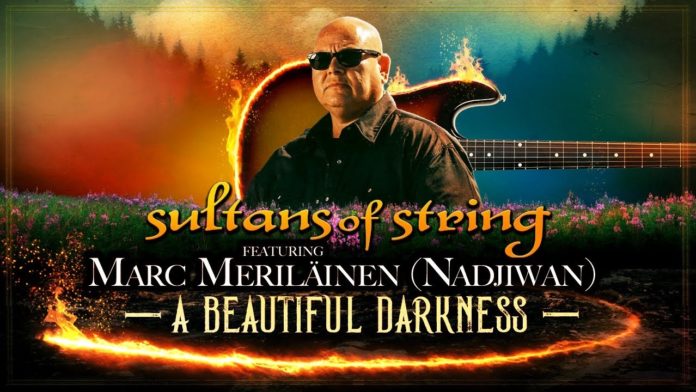“A Beautiful Darkness” is a collaboration between 3x JUNO nominated, 4x CFMA winning Sultans of String and Marc Meriläinen, the creative force also known as Nadjiwan, who has been recognized in many corners, including Canadian Aboriginal Music Awards, the Native American Music Awards, the Indigenous Music Awards, along with invitations to perform at the 2010 Vancouver Winter Olympics and the 2015 Pan-Am Games in Toronto.
It is the second single off the upcoming Sultans of String album entitled Walking Through the Fire (Sept 22, 2023 release), the most ambitious and important project of their career, a CD and concert of collaborations with First Nations, Métis, and Inuit artists across Turtle Island.
Referencing the title, Marc Meriläinen explains “We were just getting through COVID, and lockdowns, and of course, being in isolation… everyone had that feeling that this was an extra-long winter, because when we started COVID, it was still in the wintertime. And then, sure, we had spring and summer, but those seasons just blew right by, it seems. And we’re back in winter again, back into COVID.
“It seemed like everyone needed this refreshing break from the darkness that has engulfed our lives and forced us into this new way of living that we all had to adapt and adjust. But with each new night, or each night, there’s always a new day that comes. So the song is about breaking free from these barriers and these things that hold us down… or keep us maybe depressed or not feeling happy.”
Indeed, the chorus lifts the listener out of moody verses. “I always look into it as the chorus being the awakening of spring” Marc continues, “And then the light breaking through the darkness and reinvigorating our lives. And to steal Bruce Cockburn’s little quote from that song, “Gotta kick at the darkness ‘til it bleeds daylight.”
Sultans of String bandleader and violinist Chris McKhool, who was recently awarded the Dr. Duke Redbird Lifetime Achievement Award from the JAYU Festival For Human Rights, is trying to transform the darkness in his own way. “We are creating this recording in the spirit of the Truth and Reconciliation Commission’s 94 Calls to Action, and Final Report that asks that Indigenous and non-Indigenous people work together as an opportunity to show a path forward. I am really excited about working with Marc because I am a super huge fan of his work, especially the incredible skills he learned during the pandemic, working with outer space screenscapes, that have made their way into the video for this song. He is one of many fantastic Indigenous artists on my playlist right now.”
When asked about the newfound popularity of Indigenous artists, Marc says: “Definitely we are seeing a Renaissance, if you will, with Indigenous culture, and artists, and entrepreneurs, and everything else. And it’s good to keep that ball rolling. And hopefully, this project keeps that ball rolling, which I’m sure it will. And that’s one of the big reasons why I signed on. And I love everything that you’re doing with the project, because this is a great way to build some of these bridges, as well as leaving the evening or a listener with a great selection of tunes.”
Marc likens a hesitancy for more collaborations to a high school dance. “Guys are on this side of the wall. And then on the other side, the girls are here. And everyone’s afraid to ask each other out to have a dance and then have a great time. I think it’s like that in the music community, like, ‘I’d like to work with this community, but I’m not sure what the protocol is. Or maybe they don’t want me there.’ But I’ll tell you, we love working, I mean, I can’t speak for all Indigenous people, but we love working with new music, and new artists, and people from all backgrounds and ethnicities and genres, because that’s what makes music exciting. And it’s all about promoting these cross collaborations that make it exciting for the audience as well.”
Studios were used throughout Ontario to record this track, including Marc recording his guitar and vocals at his own Meriläinen Music studio, Sultans co-founder Kevin Laliberté’s guitar tracks at his own studio, multiple fiddle overdubs with Grammy and JUNO Award winning John ‘Beetle’ Bailey in New Hamburg ON, and Sultans bed tracks recorded at Jukasa Studios, an Indigenous-owned world-class recording facility on the Six Nations reserve south of Hamilton Ontario.
But the spiritual roots of the song may come from Northern Ontario. “My grandparents are Andrew Patrick and Isabel Nadjiwan. Cape Croker Chippewas of Nawash is the community.” says Marc. “Although my mother was born and raised in Wikwemikong First Nation, which is on Manitoulin Island. And there’s actually a street named after the family. If you go to Wiki, there’s Nadjiwan Lane, which the old family house used to be on. The house is no longer there, but the street is still there. So I grew up mainly in Thunder Bay in my early years. And Thunder Bay, they have a classic rock station. And then there’s all these cultural things. So it’s a large Indigenous population and Finnish population. So I remember in the summers going to different ceremonies and powwows. And in one ear I’d hear the sound of the powwow drum, the singing. But in the other ear from a car radio, I’d hear the classic rock station.
“So those two influences kind of stuck with me from, I think, when I was four or five. I didn’t know how to play the guitar. I had a fake guitar with rubber bands for strings. But I think that’s where I started working on the sound. There’s still definitely an Indigenous element there, but there’s also this classic rock sound as well. And how those two came together, it’s like the Reese peanut butter and the chocolate story, we’ll say.”







